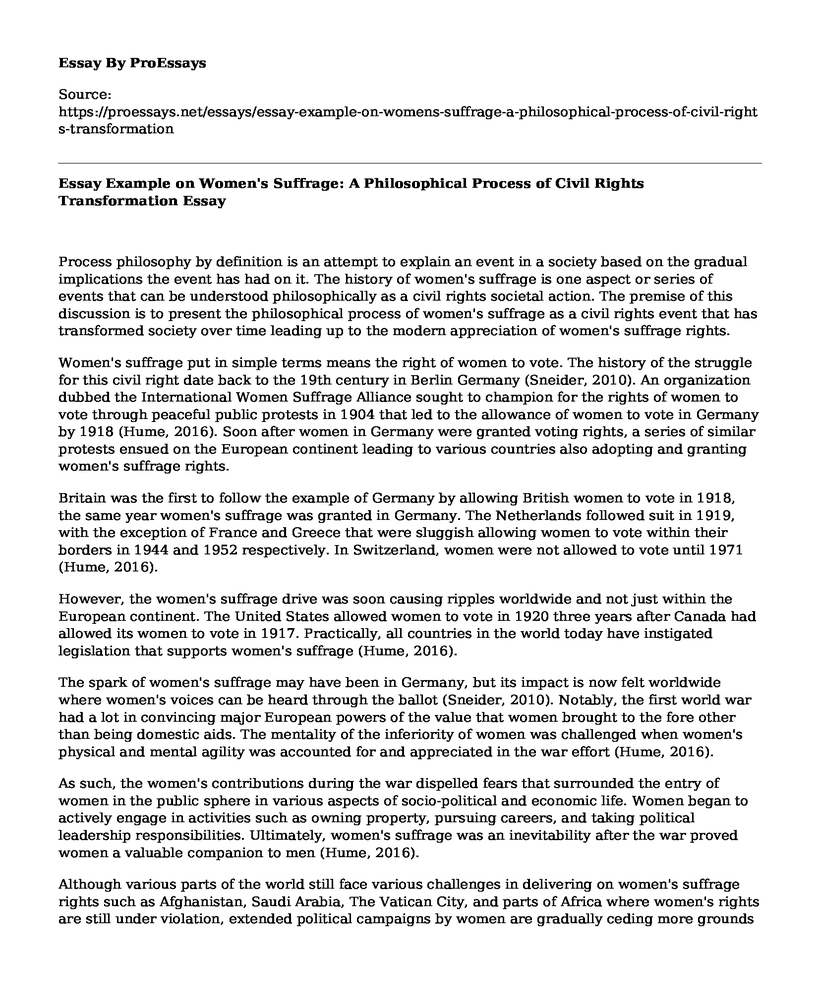Process philosophy by definition is an attempt to explain an event in a society based on the gradual implications the event has had on it. The history of women's suffrage is one aspect or series of events that can be understood philosophically as a civil rights societal action. The premise of this discussion is to present the philosophical process of women's suffrage as a civil rights event that has transformed society over time leading up to the modern appreciation of women's suffrage rights.
Women's suffrage put in simple terms means the right of women to vote. The history of the struggle for this civil right date back to the 19th century in Berlin Germany (Sneider, 2010). An organization dubbed the International Women Suffrage Alliance sought to champion for the rights of women to vote through peaceful public protests in 1904 that led to the allowance of women to vote in Germany by 1918 (Hume, 2016). Soon after women in Germany were granted voting rights, a series of similar protests ensued on the European continent leading to various countries also adopting and granting women's suffrage rights.
Britain was the first to follow the example of Germany by allowing British women to vote in 1918, the same year women's suffrage was granted in Germany. The Netherlands followed suit in 1919, with the exception of France and Greece that were sluggish allowing women to vote within their borders in 1944 and 1952 respectively. In Switzerland, women were not allowed to vote until 1971 (Hume, 2016).
However, the women's suffrage drive was soon causing ripples worldwide and not just within the European continent. The United States allowed women to vote in 1920 three years after Canada had allowed its women to vote in 1917. Practically, all countries in the world today have instigated legislation that supports women's suffrage (Hume, 2016).
The spark of women's suffrage may have been in Germany, but its impact is now felt worldwide where women's voices can be heard through the ballot (Sneider, 2010). Notably, the first world war had a lot in convincing major European powers of the value that women brought to the fore other than being domestic aids. The mentality of the inferiority of women was challenged when women's physical and mental agility was accounted for and appreciated in the war effort (Hume, 2016).
As such, the women's contributions during the war dispelled fears that surrounded the entry of women in the public sphere in various aspects of socio-political and economic life. Women began to actively engage in activities such as owning property, pursuing careers, and taking political leadership responsibilities. Ultimately, women's suffrage was an inevitability after the war proved women a valuable companion to men (Hume, 2016).
Although various parts of the world still face various challenges in delivering on women's suffrage rights such as Afghanistan, Saudi Arabia, The Vatican City, and parts of Africa where women's rights are still under violation, extended political campaigns by women are gradually ceding more grounds in securing women's suffrage rights (Sneider, 2010).
In the aftermath of world war 2, for instance, the United Nations advocated for universal suffrage. In western countries, literate women or property owners were granted suffrage before men just to show how women's rights to vote were taken seriously (Sneider, 2010). The UN Convention on the Elimination of All Forms of Discrimination Against Women of 1979 was born out of women's suffrage advocacy (Hume, 2016). Today, women all over the world have a right to vote owing to this philosophical process.
References
Hume, L. (2016). The national union of women's suffrage societies 1897-1914. Routledge.
Sneider, A. (2010). The new suffrage history: Voting rights in international perspective. History Compass, 8(7), 692-703. doi:10.1111/j.1478-0542.2010.00689.x
Cite this page
Essay Example on Women's Suffrage: A Philosophical Process of Civil Rights Transformation. (2023, May 08). Retrieved from https://proessays.net/essays/essay-example-on-womens-suffrage-a-philosophical-process-of-civil-rights-transformation
If you are the original author of this essay and no longer wish to have it published on the ProEssays website, please click below to request its removal:
- Understanding and Controlling Teenage Suicide
- Rebel Girls and Union Maids - Article Review Sample
- Are You Captive? Personal Essay Example
- Homeland Security: Preparedness, Prevention, and Deterrence
- Essay Sample on Income Inequality as a Hindrance to the Realization of the American Dream
- Essay Example on Carlos the Jackal: Notorious Terrorist and Revolutionary
- 2nd Amendment Blocks Sensible Gun Laws: Confiscation Unviable - Essay Sample







